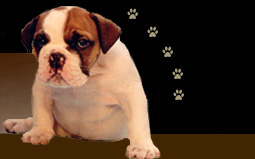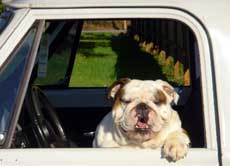Some bulldogs may have
genetic defects (especially those who are the result of poor breeding practices) and may be subject to illnesses that affect many breeds. Common health problems you may encounter include:
elongated soft palate,
small trachea, allergies, dermatitis, demodetic mange,
eye lid anomalies,
hip dysplasia and heart problems. Some of them have a tendency toward self-mutilation (especially if they have
itchy skin), so owners should watch carefully for signs of
skin irritation and scratching. If you are adopting an older dog, many of these conditions will already have been identified.
This being said, don't be too scared by talk of congenital defects and
health problems generally associated with the bulldog breed. As one author says: "
ALL breeds are subject to genetical defects in health and temperament. Working with a good breeder minimizes (but does not always eliminate) the risk that one will end up with a defective dog."
(1 )
Although some breeds have been severely damaged by poor breeding, the best response to a long list of possible defects and problems is to be alert for them at the outset. Also, keep in mind that the length of a list may reflect the state of knowledge about a breed more than the likelihood of running into problems, meaning that they have been studied more intensively. Uncommon or rare breeds are generally less studied than more common breeds like the bulldog, resulting in shorter lists. A defect in a rare breed may also propagate more quickly and be harder to eliminate from the smaller population.
An additional problem is that despite its popularity among the public, the specificity of the bulldog is poorly known by most veterinarians. What may be the right treatment or action with all other breeds may be disastrous to a bulldog. Since not all veterinarians are knowledgeable of this, please consult experienced Bulldog owners or rescue organisations to find a 'bulldog-qualified' veterinarian. Any veterinarian who will be doing surgery on your Bulldog should have previous experience with putting Bulldogs under anesthesia. If you don't have such a veterinarian in a reasonable range of your home, or if you don't know any other bulldog owners and if the breeder you intend to buy your bulldog puppy from, doesn't seem the type to provide follow-up service, it may be not a wise decision to choose a bulldog. This is even more true if this is to be your first dog.



















